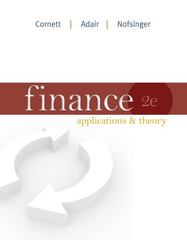Question
ECN328 Biswas Fall 2020 Quiz 3 30 points Lewis College of Business CHOICE UNDER UNCERTAINTY I. Refer to the table below. A and B are
ECN328 Biswas
Fall 2020 Quiz 3 30 points Lewis College of Business
CHOICE UNDER UNCERTAINTY
I. Refer to the table below. A and B are two investment opportunities with the same return but different probabilities associated with each return.
| Return on investment | Investment A | Investment B |
| $600 | 0.10 | 0.30 |
| $300 | 0.80 | 0.40 |
| $200 | 0.10 | 0.30 |
- Calculate the expected return from each investment. Which of the two has a higher expected return? (3)
- Calculate the variance and SD associated with the two investments. If you love to take risks, which of the two would you pick? (4)
- Suppose that a risk averse individual is offered a choice between a gamble that pays $1000 with a probability of 0.25 and $100 with a probability of 0.75, OR a certain payment of $325. Which one would he/she choose? (2)
- Consider an individual with an initial wealth of $50,000. They have the opportunity to invest in a project where they may win $40,000 with a probability of 0.8 and may lose $40,000 with a probability of 0.2. There are no out-of-pocket costs for investing in the project but if they lose then that will be deducted from their initial wealth.
- What would be the individuals expected wealth if they participate in the investment project? (2)
- If the individuals preference towards risk are defined by the function: = , would they invest in the project? (Hint: Calculate the expected utility of wealth if the individual participates in the investment and compare it with the utility of their current wealth) (4)
IV. Suppose that individuals are offered a choice between a gamble that pays $20,000 with a probability of 0.3 and $40,000 with a probability of 0.7 OR a certain payment of $34,000. For individuals exhibiting each of the following preferences towards risk indicate whether they will gamble or choose the certain payment (2 points each):
ECN328 Biswas
Fall 2020 Quiz 3 30 points Lewis College of Business
(Hint: Compare expected utility and utility of the certain payment.)
1. = 2 2. = 2 3. =
- Based on your findings in part IV, draw the graphs associated with each of the utility functions. (No calculations or math needed) (1 point each)
- Suppose that the current value of your house is $100,000. Over the next two years, the probability of a fire damage to your house is 0.1 in which case the value of your house will be $90,000.
- What is the expected value of your house two years from now? (2)
- What is your expected loss over the next two years? (2)
- You are planning to sell the house in two years at its expected value but would be equally happy if it sold for at least $98,400. Assuming that you are risk averse, what is the maximum insurance premium you are willing to pay to protect your house against the fire risk? (2)
Step by Step Solution
There are 3 Steps involved in it
Step: 1

Get Instant Access to Expert-Tailored Solutions
See step-by-step solutions with expert insights and AI powered tools for academic success
Step: 2

Step: 3

Ace Your Homework with AI
Get the answers you need in no time with our AI-driven, step-by-step assistance
Get Started


